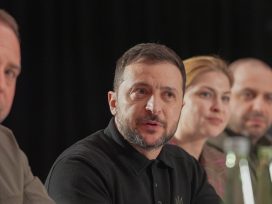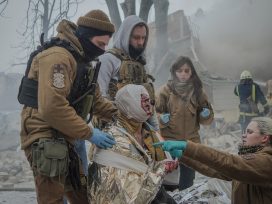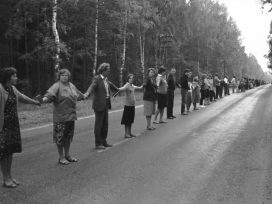The sense of an ending
Blatantly rigged elections are the easiest way for the Putin regime to mimic the authoritarian power it does not possess. December’s protests destroyed Putin’s reputation of being in control; even genuinely competitive elections would be unable to restore his legitimacy.
The protests in Moscow and other cities following the parliamentary elections in December 2011 did not hail the beginning of a Russian version of the Arab spring. Nor did they represent the belated arrival of a Ukrainian-style coloured revolution. Russia is not Egypt, for one thing. Putin is much younger than Mubarak – he has been in power for eleven years compared to Mubarak’s thirty – and the Russian population is much older than the Egyptian one and less charmed by the promise of democracy. The chances that the Russian army will side with the people are slight to non-existent and the Russian opposition lacks the organizational strength of the Islamists. While the protesters in Egypt succeeded in occupying the public square, protesters in Moscow merely visited it. Finally, the Russian authorities are better equipped financially and politically to stay in power.
Nor does Russia in 2012 resemble Ukraine in 2003. The crowds on the streets of Kiev rose up against a government that had cheated their chosen candidate of an electoral victory. The Russian protesters also felt cheated, but not because their votes for a preferred party were stolen. In fact, they protested because there was no one to vote for, venting their fury against fraudulent elections as such: “These Elections Were a Farce,” read the banners. Where the demonstrators’ entirely negative anti-Putin outrage will take the country is therefore anybody’s guess. What is certain is that “managed democracy” has collapsed before our eyes.
But how exactly should we understand this “managed democracy” – an obscure system that until recently seemed set to be the way post-communist Russia would be ruled for the foreseeable future. Now – especially after the removal of its architect, Vladislav Surkov, from his central role overseeing Russia’s electoral shenanigans – it has begun to look like an historical curiosity.
In order to unravel the enigma of “managed democracy”, we need to answer some simple questions: What is the political function of rigged elections for a government that never really pretended to be a democracy? Why did rigged elections under Putin seem both meaningless and indispensable? And how come that predictably rigged elections all of a sudden unleashed such an outpouring of bitter recrimination and resentment?
Making sense of Putin’s elections during the past decade is as important for getting his regime right as is making sense of the show trials in the 1930s for getting Stalin’s regime right. A major task of Stalin’s spin doctors seventy-five years ago was to use the trials’ pre-decided verdicts to showcase Stalin’s power – a demonstration that was all the more effective the more painfully innocent those were who, in a choreographed mise-en-scène, falsely confessed their betrayal of the Great Leader and were speedily executed for their compliance. Similarly, though much less cruelly, the show elections between 2000 and 2008 demonstrated the Putin government’s puppeteer power. The Kremlin not only manipulated those elections, it also insisted (contrary to what one might expect) that everyone be made vividly aware that it was directing the movements of every single player in the electoral charade and orchestrating every apparent crisis in the run-up to an election. The Kremlin did not play the czar, it played God.
Until recently, the paradox of Putin’s Russia has been that elections, though blatantly unfree and unfair, have been at the very heart of both the regime’s popular appeal and its authoritarian credentials. Just as Stalin’s claim to power was based on his constant purging of the Party of never-ending internal enemies, Putin’s claim to power has been based on his ability to organize elections that, although obviously rigged, have excited almost no open protest. It is also important to understand why parliamentary elections, despite the political impotence of the State Duma, have now proven to be the regime’s most vulnerable point. While presidential elections (even the one that Medvedev “won” in 2008) have been referenda on Putin himself, the parliamentary elections have gradually evolved into a referendum on Putin’s system. That is why they have become a lightning rod for civic restlessness and dissatisfaction. It proved much easier, psychologically, for a majority to vote against United Russia than against Putin, particularly bearing in mind that Putin himself has been publicly distancing himself from the party he created for much of the past year.

“Without a voice/vote”, Moscow, 25 September 2011. © Anna Yermolaeva. Source: 2012
For a decade, the majority of Russians have been convinced that the elections were, yes, rigged. But they also believed that, had elections been free and fair, Putin would have won them easily. Even when labeling Putin “the most sinister figure in contemporary Russian history,” a leading spokesman for the Russian human rights movement reluctantly admitted some years ago that, “Putin would have won the campaigns of 2000 and 2004 – though perhaps without such large, unseemly margins – even if they had been free of vote tampering and the illegal use of the government’s so-called ‘administrative resources’ and the candidates had actually had equal access to the voters through television and the press” (Sergei Kovalev). Opinion polls conducted by independent pollsters corroborated this view. Elections were meant not to choose Russia’s rulers, then, but they did serve to dramatize the unquestioningly accepted reality of the Putin majority in Russian society.
Elections were of critical importance for Putin not only for the sake of legitimacy, but also for the sake of governability. Putin could not have governed for the past decade without the ritualized authorization provided by rigged elections.
Thus, by far the most important political role of sham elections during the past dozen years has been the way they have allowed Putin to display his capacity for manipulating them in an orderly and predictable way and thereby, paradoxically, to demonstrate his authoritarian credentials. Rigged elections, known to be rigged, are the cheapest and easiest way for the regime to mimic the authoritarian power it does not actually possess and thereby to bolster its faltering grip on the country, or at least give itself more breathing room. It takes only modest administrative capacity to rig an election; but a rigged election produces a disproportionate increase in the government’s reputation for power and control. Organizing a pseudo-election is like wearing sheep’s clothing to prove that you are a wolf. Non-competitive, Soviet-style elections simulate a centralized power that Putin’s Kremlin spectacularly lacks. In a sense, fixed elections serve the same function as Red Square parades after the collapse of Russia’s military strength: they allow the regime to thump its chest, even if many of the missiles turn out, on closer inspection, to be duds.
By engineering rigged elections that nobody bothered or dared to protest, Putin managed to conceal his regime’s deepest secret, namely that Russia, rather than being misgoverned, is governed very laxly if at all. Contrary to the predominant view, Putin’s real power has never extended much beyond Moscow. Russia’s strongman has been strong enough to prevent anyone from aspiring to replace him; but he has spectacularly failed in his attempts to rule his country. Putin is not the boss of Russia. It is more realistic to see him as a hostage to regional elites. He did not succeed in overcoming the weakness of the state. He succeeded only in hiding it to some extent. His vaunted vertical of power is a sham, boiling down to a guarantee of impunity to regime loyalists and a chance for his inner circle to ascend into a charmed circle of unimaginable wealth. The latter arrangement is a different kind of vertical entirely, resembling the mountain climber’s rope by which a few friends manage to pull themselves up and away from their less fortunate fellow citizens, as in Vladimir Vysotsky’s 1967 film Vertikal. What puzzles any serious observer of Russian politics is not the ability of the elites to get things done or to impose their will, but rather their ability to steal the natural wealth of the nation with only minimal resort to violence. Putin has never been especially strong, in other words. But he has succeeded in creating a system that is relatively stable because it makes him look much stronger than he actually is.
Until now, that is. The electoral debacle of 4 December destroyed Putin’s carefully constructed reputation of being in control of events – the principal source of his seemingly immense popularity in a society where public support is bestowed on those who manage to give the impression of an unflinching grip on power. Voters were cheated in 2000, 2003, 2004, 2007 and 2008. But only in 2011 did ballot stuffing and dishonest vote tabulations (recorded on smartphones), rather than fostering cynical resignation, drive an exasperated electorate onto the streets. Putin’s party was publicly jeered on Moscow’s Bolotnaya Ploshad and Prospekt Akademika Sakharova, just as he had been personally booed a few weeks earlier at Moscow’s Olimpiisky stadium. By displaying so embarrassingly the Kremlin’s lack of political strategy for dealing with public frustration, the crowds, like the clumsily mismanaged electoral fraud, made clear why managed democracy has ceased to be a viable option for stabilizing the privileges of a politically unaccountable elite.
What we can now see, in retrospect, is that rigged elections supported the Putin system only because and so far as they were not challenged publically. When more than 50,000 people took to the streets of Moscow, the pokazukha or well-maintained illusion of government control abruptly collapsed.
Large Moscow protests have destabilized the regime not because they drew attention to its unfairness (which was long ago universally understood), but because they demonstrated its weakness, hitherto largely hidden from public view by Surkov’s showmanship. Bombing is probably the best way to destroy a village; but to destroy a Potemkin village all that is required is to change the camera angle to reveal the improvised props holding up the flimsy façade. The post-election demonstrations were an expression of this revolutionary shift in perspective.
In addition, the regime has succumbed to an aesthetic failure. Managed democracy was at heart a theatrical performance and it has failed in the way that mediocre performances can fail. First, the swap of roles between Putin and Medvedev spoiled the storyline of an open future. Then came the botched manipulation of the elections. That the 4 December parliamentary vote would offer no choice was a foregone conclusion. What finally ruined the show was that it provided no entertainment either.
On 24 September 2011, when Medvedev announced that his boss and friend Vladimir Putin was going to return to the Kremlin, a delicate balance was shattered – the perceived popular legitimacy of the regime clashed with its perceived authoritarian legitimacy. The message of 24 September was that the possibility of genuine rotation in office, alluringly suggested by the tandem, was and always had been a sham; that the switch had been decided long ago and the whole thing was closely controlled. Those who had placed their hopes in Medvedev were exposed as naive dupes and disposable stage-props in Putin’s personal theater of survival. It turned out that Russia’s “managed democracy” was not simply a regime without a choice. Much worse, it was a play without a publicly convincing plot.
In the run-up to the 2000 elections, the totally unknown Vladimir Putin engineered the Chechen crisis in order to convince Russians that he could save them from the chaos and war. In 2004, he managed to make Russians believe that the choice they faced was between him and the oligarchs. Khodorkovsky was thrown in jail and the majority of Russians preferred to believe that their president had finally broken the chain connecting him to Yeltsin’s self-enriching circle. In 2008, contrary to expectations, he decided not to run for a third term, thus promising substantial changes in the framework of existing power. In all three cases, in other words, presidential elections were framed by a dramatic and easily comprehensible public narrative.
In 2012, by contrast, Putin has no story to tell. It is completely unclear in what way public interest could possibly be served by his returning to the Kremlin. He is not coming back to handle the Chechens, because they are now allegedly his most loyal supporters: United Russia won an eye-popping 98 per cent of the vote in Kadyrov’s fiefdom. Nor is Putin coming back to save the Russians from the oligarchs, because the new oligarchs are his old St. Petersburg buddies. All those who had hoped that the regime could be modernized under a younger president feel humiliated by their own embarrassing naivety. In 2012, Putin has not only lost his image as someone who can solve crises: he is no longer able to create new crises which he can triumphantly resolve because, at this point, any crisis that emerges will be blamed on him. The only thing Putin can tell those who ask why he wants to return to the Kremlin is that he has nowhere else to go. (That he needs to stay in power to protect his “business interests”, while widely assumed, is obviously not a tale for public consumption.)
Putin is now facing a dilemma similar to the one Gorbachev faced in the last two years of the Soviet Union. Genuinely competitive elections, assuming that he won them, might possibly rescue his collapsing legitimacy. But winning an election that he might have lost would not be the end of Putin’s troubles. Afterwards, he would start to be held publicly responsible for his actions. The media would freely report on his business associates and the opposition would be constantly after him, pointing out all the promises he failed to keep. This means that he would perhaps keep power temporarily but that eventually he would lose. Shooting at protesters is an even less attractive option, even if it were feasible. In 1993, true enough, Yeltsin shelled the parliament; but back then Russian society was ideologically divided and the most radical democrats supported Yeltsin’s decision to shoot. The West was also behind Yeltsin. Today, Putin can reasonably fear that shooting at relatively affluent urban crowds might land him where Gaddafi ended up. History shows that only politicians with a strong social support base – rooted in ideology, religion, or kinship – dare shoot at protesters.
Published 17 February 2012
Original in English
First published by iwmPost 108 (2012)
Contributed by Transit © Stephen Holmes / Ivan Krastev / Transit / Eurozine
PDF/PRINTPublished in
In collaboration with
In focal points
Newsletter
Subscribe to know what’s worth thinking about.
Related Articles

The ‘Trump–Putin deal’ again places Ukrainians in a subaltern role. The leaked contract with its fantasy $500 billion ‘payback’ has been compared to Versailles, but the US betrayal recalls nothing so much as Molotov–Ribbentrop.

Ukraine faces its greatest diplomatic challenge yet, as the Trump administration succumbs to disinformation and blames them for the Russian aggression. How can they navigate the storm?






